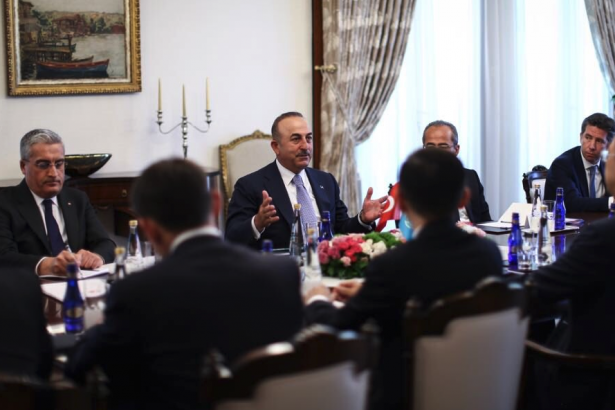Third parties are trying to weaken Astana process: Turkish FM

Some other counterparties, which are not part of the Astana process, "are trying to weaken the collaboration of three guarantors," Foreign Minister Mevlüt Çavuşoğlu has said on April 19.
"We see that countries, which are not part of Astana, are trying to weaken the Astana process," Çavuşoğlu said speaking at a joint press conference with Kazakh Foreign Minister Kairat Abdrakhmanov.
"We see some jealousy," he said, noting they would continue with the Astana process in the upcoming period.
The next meeting on the Syrian settlement in the Kazakh capital of Astana will take place on May 14-15, Çavuşoğlu also said.
"The most important decisions on Syria were made in Astana and then in Sochi [during the Syrian National Dialogue Congress]. This process complements the one in Geneva. We will continue the negotiations. the next meeting will take place in Astana on May 14-15," he said.
'MACRON WANTED TO BE PART OF THE TRILATERAL SUMMIT'
Astana has hosted eight rounds of talks on the Syrian settlement with the most recent one held in December. During the latest meeting Russia, Iran, and Turkey, the three "Syrian ceasefire guarantor states", agreed to set up a working group on the release of detainees and adopted a statement on humanitarian mine clearance.
In his earlier remarks, Çavuşoğlu claimed French President Emmanuel Macron wanted to be part of the trilateral summit between Turkey, Russia, and Iran held in Ankara in early April over Syria.
When Ankara asked the other participant countries, Russia welcomed the proposal, while Iran preferred to host France in a separate meeting, so Macron did not attend the trilateral summit, Çavuşoğlu said.
US AIMS TO ENLIST ANKARA AS MORE ACTIVE ALLY IN GENEVA PROCESS
The top U.S. diplomat for Europe, Wess Mitchell, said on April 18 that Washington intended to encourage Turkish AKP government to become more actively involved in the Geneva process for Syria.
"It is in the American national interest to see Turkey remain strategically and politically aligned with the West, and we believe it is also in Turkey’s interests. Our policy has been to combine close engagement with clear messaging that the United States will actively defend its interests. In the context of Syria, we have engaged in high-level interagency discussions, both to address legitimate Turkish security concerns and to avoid inadvertent collisions between our forces," Mitchell said.
"These conversations are ongoing. Moving forward, our aim is to enlist Turkey as a more active ally in supporting the Geneva process, the defeat of ISIS and lasting stabilization in Syria, as well as a long-term factor in thwarting expansion by Russia and Iran, as outlined in the National Security and National Defense Strategies," he added.




